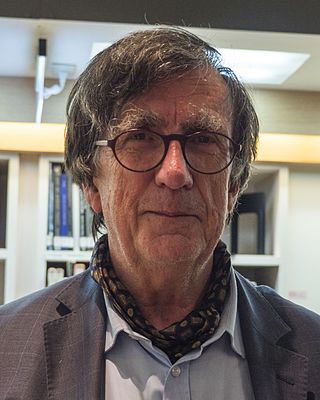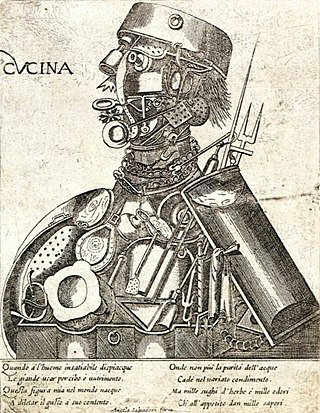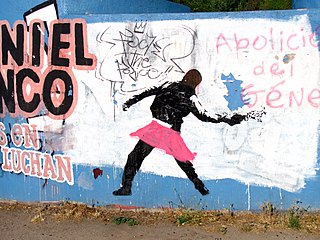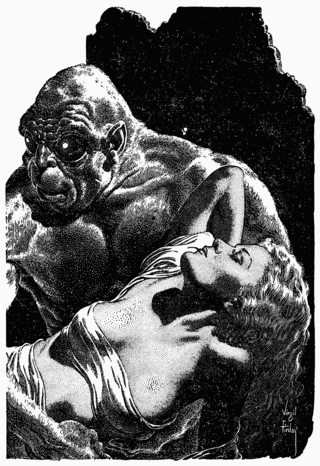
Anthropology is the scientific study of humanity, concerned with human behavior, human biology, cultures, societies, and linguistics, in both the present and past, including archaic humans. Social anthropology studies patterns of behavior, while cultural anthropology studies cultural meaning, including norms and values. The term sociocultural anthropology is commonly used today. Linguistic anthropology studies how language influences social life. Biological or physical anthropology studies the biological development of humans.

Cultural anthropology is a branch of anthropology focused on the study of cultural variation among humans. It is in contrast to social anthropology, which perceives cultural variation as a subset of a posited anthropological constant. The term sociocultural anthropology includes both cultural and social anthropology traditions.

Posthumanism or post-humanism is an idea in continental philosophy and critical theory responding to the presence of anthropocentrism in 21st-century thought. Posthumanization comprises "those processes by which a society comes to include members other than 'natural' biological human beings who, in one way or another, contribute to the structures, dynamics, or meaning of the society."

Donna J. Haraway is an American professor emerita in the history of consciousness and feminist studies departments at the University of California, Santa Cruz, and a prominent scholar in the field of science and technology studies. She has also contributed to the intersection of information technology and feminist theory, and is a leading scholar in contemporary ecofeminism. Her work criticizes anthropocentrism, emphasizes the self-organizing powers of nonhuman processes, and explores dissonant relations between those processes and cultural practices, rethinking sources of ethics.

An anthropologist is a person engaged in the practice of anthropology. Anthropology is the study of aspects of humans within past and present societies. Social anthropology, cultural anthropology and philosophical anthropology study the norms, values, and general behavior of societies. Linguistic anthropology studies how language affects social life, while economic anthropology studies human economic behavior. Biological (physical), forensic and medical anthropology study the biological development of humans, the application of biological anthropology in a legal setting and the study of diseases and their impacts on humans over time, respectively.

Bruno Latour was a French philosopher, anthropologist and sociologist. He was especially known for his work in the field of science and technology studies (STS). After teaching at the École des Mines de Paris from 1982 to 2006, he became professor at Sciences Po Paris (2006–2017), where he was the scientific director of the Sciences Po Medialab. He retired from several university activities in 2017. He was also a Centennial Professor at the London School of Economics.
Actor–network theory (ANT) is a theoretical and methodological approach to social theory where everything in the social and natural worlds exists in constantly shifting networks of relationships. It posits that nothing exists outside those relationships. All the factors involved in a social situation are on the same level, and thus there are no external social forces beyond what and how the network participants interact at present. Thus, objects, ideas, processes, and any other relevant factors are seen as just as important in creating social situations as humans.

"A Cyborg Manifesto" is an essay written by Donna Haraway and published in 1985 in the Socialist Review (US). In it, the concept of the cyborg represents a rejection of rigid boundaries, notably those separating "human" from "animal" and "human" from "machine." Haraway writes: "The cyborg does not dream of community on the model of the organic family, this time without the oedipal project. The cyborg would not recognize the Garden of Eden; it is not made of mud and cannot dream of returning to dust."
Digital anthropology is the anthropological study of the relationship between humans and digital-era technology. The field is new, and thus has a variety of names with a variety of emphases. These include techno-anthropology, digital ethnography, cyberanthropology, and virtual anthropology.

Postgenderism is a social, political and cultural movement which arose from the eroding of the cultural, psychological, and social role of gender, and an argument for why the erosion of binary gender will be liberatory.
Criticism of technology is an analysis of adverse impacts of industrial and digital technologies. It is argued that, in all advanced industrial societies, technology becomes a means of domination, control, and exploitation, or more generally something which threatens the survival of humanity. Some of the technology opposed by the most radical critics may include everyday household products, such as refrigerators, computers, and medication. However, criticism of technology comes in many shades.
The following outline is provided as an overview of and topical guide to anthropology:

Posthuman or post-human is a concept originating in the fields of science fiction, futurology, contemporary art, and philosophy that means a person or entity that exists in a state beyond being human. The concept aims at addressing a variety of questions, including ethics and justice, language and trans-species communication, social systems, and the intellectual aspirations of interdisciplinarity.

A cyborg —a portmanteau of cybernetic and organism—is a being with both organic and biomechatronic body parts. The term was coined in 1960 by Manfred Clynes and Nathan S. Kline. In contrast to biorobots and androids, the term cyborg applies to a living organism that has restored function or enhanced abilities due to the integration of some artificial component or technology that relies on feedback.
This bibliography of anthropology lists some notable publications in the field of anthropology, including its various subfields. It is not comprehensive and continues to be developed. It also includes a number of works that are not by anthropologists but are relevant to the field, such as literary theory, sociology, psychology, and philosophical anthropology.
Technoself studies, commonly referred to as TSS, is an emerging, interdisciplinary domain of scholarly research dealing with human identity in a technological society focusing on the changing nature of relationships between the human and technology. The self is a key concept of TSS. The term "technoself", advanced by Luppicini (2013) aims to avoid ideological or philosophical biases inherent in other related terms including cyborg, posthuman, transhuman, techno-human, beman, digital identity, avatar, and homotechnicus- though Luppicini acknowledges that these categories "capture important aspects of human identity". Technoself is further elaborated and explored in Luppicini's "Handbook of Research on Technoself: Identity in a Technological Environment".

Robbie Davis-Floyd is an American cultural, medical, and reproductive anthropologist, researcher, author, and international speaker primarily known for her research on childbirth, midwifery, and obstetrics. She chose to study women's birth experiences due to her own birth experiences and espouses the viewpoint that midwives play an important role in safeguarding positive outcomes for women giving birth. Beginning in 1983, she has given over 1000 presentations at universities and childbirth, midwifery, and obstetric conferences around the world.
The ontological turn is an increased interest in ontology within a number of philosophical and academic disciplines during the early 2000s. The ontological turn in anthropology is not concerned with anthropological notions of culture, epistemology, nor world views. Instead, the ontological turn generates interest in being in the world and accepts that different world views are not simply different representations of the same world. More specifically, the ontological turn refers to a change in theoretical orientation according to which differences are understood not in terms of a difference in world views, but a differences in worlds and all of these worlds are of equal validity.
Feminist science and technology studies is a theoretical subfield of science and technology studies (STS), which explores how gender interacts with science and technology. The field emerged in the early 1980s alongside other relativist theories of STS which rejected the dominance of technological determinism, proposing that reality is multiple rather than fixed and prioritizing situated knowledges over scientific objectivity. Feminist STS's material-semiotic theory evolved to display a complex understanding of gender and technology relationships by the 2000s, notable scholars producing feminist critiques of scientific knowledge and the design and use of technologies. The co-constructive relationship between gender and technology contributed to feminist STS's rejection of binary gender roles by the twenty-first century, the field's framework expanding to incorporate principles of feminist technoscience and queer theory amidst widespread adoption of the internet.

The anthropology of technology (AoT) is a unique, diverse, and growing field of study that bears much in common with kindred developments in the sociology and history of technology: first, a growing refusal to view the role of technology in human societies as the irreversible and predetermined consequence of a given technology's putative "inner logic"; and second, a focus on the social and cultural factors that shape a given technology's development and impact in a society. However, AoT defines technology far more broadly than the sociologists and historians of technology.











